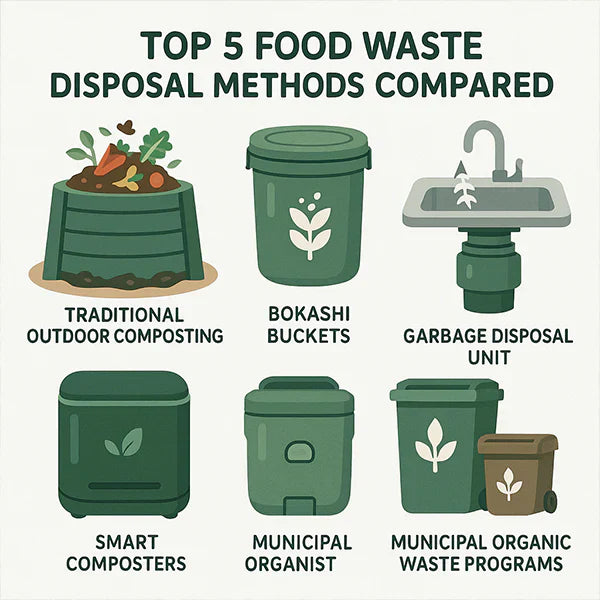
🌱 What Is The Best Food Waste Disposal Method? – Which One Should You Choose?
Share
It’s no great secret that food waste is an increasingly problematic issue in the United States—it’s estimated that more than 30% of the food supply is wasted every year, according to the EPA. But the good news? You can have an impact at home! 🍎♻️
Here we discuss five food waste disposal methods — from the old-fashioned to the high-tech — and guide you to the best one for the compromise between efficiency, eco-friendliness and daily convenience.
🏡 1. Compost the Old-Fashioned Way outdoors Composting at home, in your backyard, is tried and true. Just collect your peels, coffee grounds and vegetable scraps and toss them in a compost bin: Wait.
✅ Pros:
-
Environmentally friendly ♻️
-
Converts waste into rich fertilizer 🌿
❌ Cons:
-
Takes weeks or even months Requires space and repairs outside
Best for: Gardeners with the time and yard space to manage them.
🔄 2. Bokashi Buckets Anaerobic food scrap fermentation is the hallmark of the Bokashi process. It's a more rapid alternative to the traditional method of composting and can be used indoors.
✅ Pros:
-
Compatible with all types of food
-
Great for small spaces
❌ Cons:
-
You have to buy Bokashi bran
-
Yet to be buried final product
Best for: Apartment dwellers who want something small.
🚮 3. Garbage Disposal Unit This system is installed in your kitchen sink and grinds food waste so it can go down your plumbing.
✅ Pros:
-
Fast and convenient
-
No odor or mess
❌ Cons:
-
Not eco-friendly
-
Can clog pipes
-
Not for use on fibrous or oily waste
Best for: Busy families that don’t want to compost.
⚡ 4. Smart Composters – 24-Hour Food Recycler
Smart Composter the Food Recycler is a low waste solution to household waste. Now let’s talk high-tech.
💡Introducing Smart Kitchen Waste Composter is a rapid composting product that composts your kitchen waste to a pleasantly fragrant, moist, backyard-ready soil amendment in just 24 hours! 🌎🌼
✅ Pros:
-
Works in just 24 hours ⏱
-
Odorless and clean
-
No worms or outdoor bins – Totally automatic, great for the modern lifestyle
-
Aids the growth of veggies with its “Food waste & composting 2 in 1” feature 🥬🌶️
❌ Cons:
-
Higher upfront cost
-
Requires electricity Best for: Green gadget geeks and modern families.
-
👉 Learn more and get yours here
🧪 5. Organic Programs of Civic Waste Some cities also offer organic waste pick-up.
✅ Pros:
-
Easy and hands-off
-
Eco-friendly
❌ Cons:
-
Not available everywhere
-
You have to separate food waste correctly
Best for: Urban residents in liberal cities.
✅ Quick Look: Compare and Contrast
| Method | Speed | Space Required | Eco-friendly | Maintenance |
| Outdoor Composting | 30~90days | High | ✅ Yes | 🛠️ Medium |
| Bokashi Bucket | 14~21days | Low | ✅ Yes | 🛠️ Medium |
| Garbage Disposal | 5~10mins | Low | ❌ No | 🔧 Low |
| Smart Composter (MB4) | ⚡ 24 hours | Low | ✅ Yes | 🛠️ Low |
| City Collection Program | 7~14days | Low | ✅ Yes | 🔧 Low |
❓ FAQ Section
Q1: Is it safe to use an indoor smart kitchen waste composter?
Absolutely! Our being lightweight makes it ideal for light duty task & for & for use in the home, office or outdoor.You need to be able to easily hear siren or noises.They are Quiet! our unit was designed with kitchens in mind.
Q2: Will it perform well with cooked and greasy food?
Yes! Our 24-hour leach field does what traditional composters do not- break down nearly all kitchen waste, including meats and oils.
Q3: What can I do with the compost?
Put it to use in your home garden, flower beds, or better yet, even donate it to local farms 🌻.
Q4: Is it bad for the environment to use an electric composter because it uses electricity?
No at all — quite the opposite.
🌍 Let’s break it down:
-
🔌 Electricity: Consumption: The electricity using for our smart composter is approximately 1.43 kWh per KG. When it runs on a clean grid, its carbon footprint is negligible.
-
🏞️ Landfill impact: When waste food is sent to landfills, it breaks down anaerobically, releasing methane (CH₄)—a greenhouse gas that is more than 80x more potent than CO₂ over a 20-year period.
-
📉 Net Effect: Electric composters slash total greenhouse gas emissions by diverting waste from landfills and converting it into compost that you can use — even after accounting for electricity usage.
-
📊 You want to see the numbers yourself? Try out this Food Waste Carbon Footprint Calculator to calculate how much methane you’re diverting by composting your food scraps weekly.
✅ Conclusion: A fashion composter An electric composter is a small power user with a big environmental payoff — particularly when weighed against the environmental damage done by decades of food waste in landfills.
🧠 Quote for Reflection
“Waste is not waste until we waste it!” — Will. i.am

